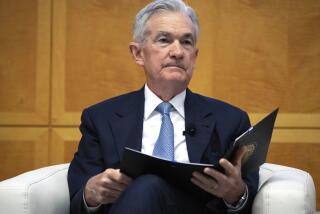Fed Opposes Legal Cap on Credit Card Interest Rates
- Share via
WASHINGTON — The Federal Reserve said Tuesday that it opposes a federal cap on credit card interest rates, contending that a new legal ceiling could mean fewer people would get cards and their overall cost may increase.
Martha R. Seger, a member of the Fed’s board of governors, told the Senate Banking subcommittee on consumer affairs that the Fed supports reasonable disclosure requirement to ensure that consumers know how much a credit card will cost.
But bills pending in Congress to impose ceilings are inappropriate, she said.
“Consumer loans are more fairly and efficiently allocated where there are no regulatory constraints on interest rates,” she said. “Setting a federal ceiling . . . would likely reduce the amount of credit made available, forcing consumers to rely instead on less convenient and possibly more expensive substitutes, or to lose access to credit at any rate.”
She said the burden would fall most heavily on lower-income borrowers with limited access to other sources of credit. And, she said, the rate ceilings might lead to increases in other credit card charges, such as annual fees and processing charges, or to an end to the interest-free “grace period” on bills.
The banking subcommittee is considering bills aimed limiting interest rates on credit cards, which have averaged close to 20% while other consumer interest rates have plummeted. Some bills call for more disclosure, while others would simply impose a ceiling pegged to current market rates.
Sen. Christopher Dodd (D-Conn.), the subcommittee’s chairman, said he would prefer not to enact an interest ceiling cap. But if disclosure requirements that force card issuers to disclose their terms in more detail fail to bring down rates, he said, Congress likely will look at caps within the next year or two.
Dodd called it a mystery “how credit cards can defy the laws of gravity by actually rising at a time when all other interest rates have plummeted.”
While other rates have fallen--the prime rate hitting a low of 7.5%--rates charged by four of the six largest issuers of Visa and Mastercard have remained above 19%, he said. The other two only recently fell below 18%.
But James B. Wiesler of Visa USA, contended that credit cards “are far more costly to administer than other consumer credit programs.”
The cost of money accounts for only 40% of the expense of a credit card transaction, he said. The remainder goes for processing costs and to losses--which are higher than for other forms of credit because the debt is unsecured.
But Rep. Charles Schumer (D-N.Y.) of the House Banking Committee, told the Senate panel there is a subtle agreement among the major card issuers not to compete on interest rates.
“They’re all winking at each other,” he said. “They’re all saying ‘if you don’t lower your rates, I won’t lower mine.’ ”
Administrative costs are “something of a smoke screen,” he said. “Many of the smaller banks have lower rates than the bigger banks” even though processing costs should be more economical in large operations. “If the administrative costs were so important, you wouldn’t see smaller banks issuing credit cards at lower rates than the bigger banks.”
More to Read
Inside the business of entertainment
The Wide Shot brings you news, analysis and insights on everything from streaming wars to production — and what it all means for the future.
You may occasionally receive promotional content from the Los Angeles Times.










